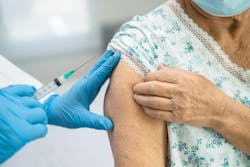CDC updates RSV vaccination recommendation for adults
The Centers for Disease Control and Prevention (CDC) updated its recommendation for the use of Respiratory Syncytial Virus (RSV) vaccines in people ages 60 and older.
For this upcoming respiratory virus season, CDC recommends:
- Everyone ages 75 and older receive the RSV vaccine.
- People ages 60–74 who are at increased risk of severe RSV, meaning they have certain chronic medical conditions, such as lung or heart disease, or they live in nursing homes, receive the RSV vaccine.
This recommendation is for adults who did not get an RSV vaccine last year. The RSV vaccine is not currently an annual vaccine, meaning people do not need to get a dose every RSV season. Eligible adults can get an RSV vaccine at any time, but the best time to get vaccinated is in late summer and early fall before RSV usually starts to spread in communities.
The updated recommendation for people 60 and older replaces the recommendation made last year to simplify RSV vaccine decision-making for clinicians and the public.
The updated recommendation is based on analyses of RSV disease burden among people 60 and older, as well as RSV vaccine effectiveness and cost-effectiveness studies. Those studies included the first real-world data since RSV vaccines were recommended for people 60 and older.
Healthcare providers should recommend RSV vaccines to their eligible patients, as well as discuss what other vaccines they will need this fall to help prevent respiratory infections.

